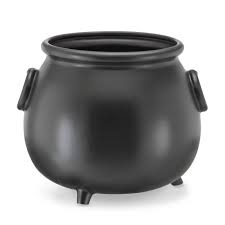cauldron
英 [ˈkɔːl.drən]
美 [ˈkɑːl.drən]
- n. 大汽锅,大锅;煮皂锅
使用频率:

记忆方法
将“cauldron”分解为“cau”与“dron”。联想“cau”像是“cow”(牛)的叫声,而“dron”可以联想到“drone”(嗡嗡声)。想象一个巨大的“cauldron”里煮着东西,发出“cow”的叫声和“drone”般的嗡嗡声,这样的场景有助于记忆这个单词的含义——大锅或大煲。
以上内容由AI生成, 仅供参考和借鉴
中文词源
cauldron 大锅
来自拉丁词calidus, 热的,加热,词源同calorie, 卡路里。
英语词源
- cauldron
-
cauldron: [13] Etymologically, cauldrons are for heating not food but people. The word comes ultimately from Latin calidārium ‘hot bath’, which was a derivative of the adjective calidus ‘warm’ (related to English calorie, and, by a much more circuitous route, lee ‘sheltered area’ and probably lukewarm). Among the descendants of calidārium were late Latin caldāria ‘pot’, which produced French chaudière (possible source of English chowder) and Vulgar Latin *caldario, which passed into Anglo-Norman, with a suffix indicating great size, as caudron ‘large cooking pot’.
In English, the l was reintroduced from Latin in the 15th century.
=> calorie, chowder, nonchalant - cauldron (n.)
- c. 1300, caudron, from Anglo-French caudrun, Old North French cauderon (Old French chauderon "cauldron, kettle"), from augmentative of Late Latin caldaria "cooking pot" (source of Spanish calderon, Italian calderone), from Latin calidarium "hot bath," from calidus "warm, hot" (see calorie). The -l- was inserted 15c. in imitation of Latin.
权威例句
- 1. The stadium was a seething cauldron of emotion.
- 体育场内群情沸腾。
- 2. Several men were thrown into a boiling cauldron.
- 几个人被扔进滚水锅中.
- 3. They used the method of removing the burning brands from under the boiling cauldron.
- 他们使用了釜底抽薪的办法.
- 4. A thin veneer of law and order barely keeps the seething, bubbling cauldron of chaos and anarchy in check.
- 表面上的几条法令基本控制不住无政府混乱局面的湍流涌动。
- 5. Everyone crowded around a huge cauldron of boiling sap.
- 大家都围挤在一个熬枫浆的大锅旁.